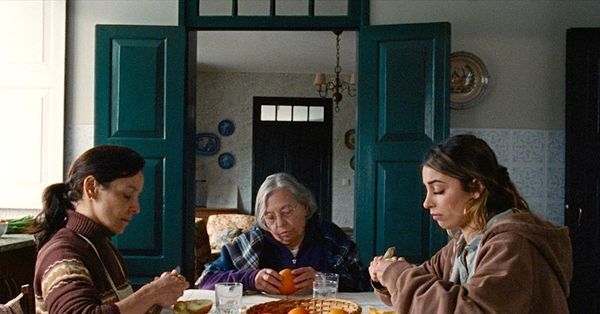Eye For Film >> Movies >> Légua (2023) Film Review
Légua
Reviewed by: Nikola Jovic

When Ana’s daughter confronts her by exclaiming: “Why do you waste your time taking care of this Dracula’s castle, when nobody is ever around?”, we begin to ponder the ultimate meaning of subserviance and indebting oneself when that love isn’t returned? In their latest cinematic achievement, the directorial duo João Miller Guerra and Filipa Reis, will allude to themes of liminal spaces and rural work impacting the inner life, as well as the the generation gap, the disintegration of the working-class family, while the ultimate point is eluding us. Légua premiered at this year’s Cannes Film Festival in the Directors' Fortnight section.
We’re first greeted by a sight of a middle-aged woman, Ana (Carla Maciel), dancing to a pop song, as she’s dressing intimately and making herself ready for the loving embrace of her husband, who is always away working seasonal construction jobs in France. After their passionate lovemaking, he proposes a subject of her and their daughter accompanying him to France, but Ana is reluctant because of her own job. Along with the old caretaker Emília (Fátima Soares), the two of them are maintaining the appearance of an old mansion, owned by absent aristocrats, as perfectly as possible. While the mansion itself is for sale, nobody ever inquires about it, nor do its owners ever visit, but regardless, rigorous Emília insists on redoing everything until the house is in meticulous shape. Things get complicated when the old caretaker becomes bedridden due to her old age and illness, and suddenly Ana’s chances of joining her husband become even slimmer, as she feels indebted to Emília to help her while she is in need, because Emília looked after her when she had problems raising her daughter Mónica. But what good is it, if she’s sacrificing her family and her daughter’s prosperity for the sake of the old house and the old caretaker? Why is she living in, and for, the past?

Given that Jeanne Dielman 23, quai du commerce, 1080 Bruxelles by Chantal Akerman was announced as the greatest film of all time in Sight and Sound’s latest poll of international critics at the very end of last year, one can’t help but wonder if this is the early prelude to the storm of a film that is about the take the stage. Much like Jeanne Dielman, big chunks of this film centre on Ana’s repetitive tasks of tending the garden, doing fieldwork, a lot of scenes of farming that feature a lot of repetitive motions, as well as the basic housekeeping. But unlike Dielman, where the repetitiveness serves to drive a point of how the outside structures impose a certain control down to the very motions of the body, here we’re seeing almost the opposite. How multiple generations are vanishing mediators for keeping the mansion intact.
The husband expresses a similar type of relationship towards his work and ownership. He works seasonal jobs in France so he can invest all of his money into building and expanding their home, which, essentially, no one aspires to live in, since their daughter wants to move to an urban area, and Ana has committed herself to helping Emília. Those houses almost feel like tombstones. Personal existential projects that demarcate that someone once cared for and poured their will and effort into them.
The way houses impact the perception of the story creates almost a liminal feeling of time being out of joint, with different architectures, attitudes, life purposes, and lifestyles, all existing simultaneously. This quality of the film draws our attention to the fact that it can serve as a podium for exhibiting a generational gap in the rural north of Portugal. While we do get three different generations of women here, Ana is presented as a singular POV character, and her relationship towards the mansion and Emília are second to none.
Through their previous films, Miller Guerra and Reis explored the impact of different spaces in ego formation, which also translate into interesting cinematic ideas when these characters are inhabiting those spaces, and that goes for Légua as well. What perhaps presents itself as troubling is that while a lot of these themes are present, most of them are not resolved, elaborated, or commented upon. Coupled with a slow pace and plot, one starts to wonder, what is supposed to be the propelling force of the story.
Setting the themes aside, the film is at its strongest when viewed as the sum of its parts — as the individual observational pieces of picturesque, yet jagged, rural life entices you every chance it gets. From detailed mannerisms in the way the men work on the construction of the house: spreading mortar and laying bricks. By observing Ana’s repetitive motions with a farming hoe, or how people in groups interact with music… Cold framing, lensed by Vasco Viana, makes for some of the most authentic representations of the rural working class in the past couple of years, leaving us with an impression of witnessing life as it is lived. But just like in life itself, the sensation can feel like watching the paint dry.
Reviewed on: 08 Aug 2023
















